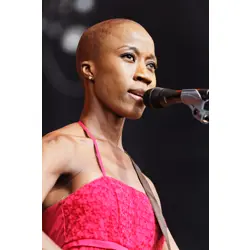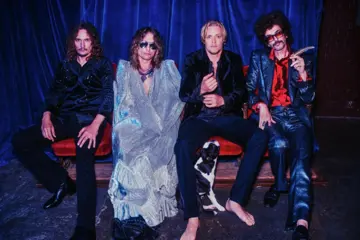 Rokia Traoré
Rokia TraoréThe physical difference between Mali musician Rokia Traoré since her last visit to Australia a couple of years back is striking. As she walks onto stage to rapturous applause she's all sinew and muscle, with her hair closely cropped. The sex bomb with the big bombastic band from WOMADelaide is now a stately ambassador giving back to her country of birth. Tonight's performance is all about her charitable work. A few years back she returned to Mali and set up a foundation to provide the opportunity for aspiring musicians to develop their skills. Her tour to Australia is to raise money for the foundation, though also to give some of the singers an opportunity to tour and perform live with the great woman and her band.
Typically, for Traoré, the instrumentation is a fusion of traditional Malian instruments, notably the kora (African harp) and the ngoni, (a distinctive lute-like instrument made from hide) with a drum kit, electric guitar and double bass. Tonight it's all cover versions of old Mali music that are rarely performed these days. The kora, surely one of the most lyrical instruments in the world, features prominently, though of course it's Traoré's smoky voice that is nothing short of spellbinding. She effortlessly commands the stage, almost whispering between songs. Mali's current social and political upheavals are never far from the surface, and she thanks the international community for sending in troops. “It's not about religion or a god,” she offers, “it's about greed.” She's concerned that the Islamists who have imposed sharia law in the North want to remove the ethnic diversity of Mali, and they want to take away the incredible music.
The music is beautiful, the backup singers swaying effortlessly behind the music, before occasionally taking centre stage themselves with Traoré returning to their place to provide backing vocals. The covers eventually move into West Africa and further; Bob Marley's Zimbabwe, Fela Kuti's Lady, Miriam Makeba, even Tabu Ley Rochereau. She has us clapping, gets us up to dance and even sings happy birthday to a friend's father. All the while the audience marvels at her beauty, her remarkable voice and the incredible music and vitality that pours forth from this amazing woman.


















